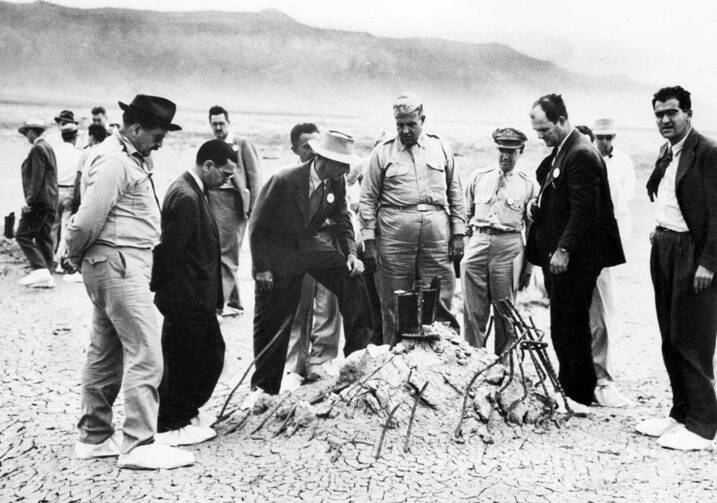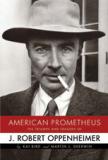Tested by Fire
J. Robert Oppenheimer, the physicist whose brilliant blue eyes came to express such engulfing sadness, brought a new kind of fire into the world and was burned by it. Like Hesiod’s Prometheus, Oppenheimer fought on the side of humankind, giving us the tools and weapons to determine our own fate; and fate punished him for it. This magnificent biography recounts in substantive detail Oppenheimer’s concern for his country and the welfare of its people, the achievement of the atomic bomb, his contributions as scientist and educator and his bitter end, in which he nevertheless found a moral stature that should put the gods of the American polity to shame. It is not, however, a hagiography.
Robert—later Opje, or Oppie—began his life on the Upper West Side of New York City in 1904 in a Jewish household where Jewish traditions played no role. The Ethical Culture Society, founded by Felix Adler, emphasized the individual’s obligation to act on behalf of others, especially those less fortunate than oneself. Attending the society’s private school, young Oppenheimer grew up in an atmosphere of responsible awareness. The authors, Kai Bird (contributing editor of The Nation) and Martin J. Sherwin (professor of English and American history at Tufts University) argue—and it seems irrefutable—that the Ethical Culture philosophy underpinned many of Oppenheimer’s later actions. What may have seemed leftist sympathies were the conscience of an enlightened human being, as they were for a good many persons during the 1930’s and 40’s.
Oppenheimer was high-strung, soft-spoken and a polymath. He was also ambitious, articulate, rashly dismissive of intellectual pretenders, kind and generous to students and given to sometimes inexplicable behavior under personal stress. In 1926, visiting Corsica with friends, Oppenheimer experienced what he described long afterward as "not a mere love affair, not a love affair at all, but love.... A great thing in my life, a great and lasting part of it, more to me now, even more as I look back when my life is nearly over." He had been reading Proust by flashlight. A decade later he would recite this passage from memory:
Perhaps she would not have considered evil to be so rare, so extraordinary, so estranging a state, to which it was so restful to emigrate, had she been able to discern in herself, as in everyone, that indifference to the sufferings one causes, an indifference which, whatever other names one may give it, is the terrible and permanent form of cruelty.
It was perhaps this insight that had so seized him, for, after Los Alamos, he counseled against the development of the hydrogen bomb and the increase in our nuclear arsenal, and urged the formation of an international committee to which nations, including ours, would surrender sovereignty over their nuclear programs. He believed that only respectful openness among the nuclear nations would prevent an arms race and the possibility of other nations acquiring the bomb. Moreover, "[t]he trouble with secrecy is that it denies to the government itself the wisdom and resources of the whole community," he said. No great stretch of the imagination is needed to read—in the cold war, uranium gone astray, the threat of nuclear terrorism and the secrecy of the current administration—a doom foretold, a best chance lost.
But perhaps Oppenheimer’s chief characteristic was, ironically, his sense of loyalty. The novelist E. M. Forster once said: If I had to choose between betraying my country and betraying my friend, I hope that I should have the guts to betray my country. At least until the grilling by the Atomic Energy Commission security review panel, Oppenheimer remained loyal to his friends, causing the powers-that-were to question his loyalty to his country.
Einstein said that Oppenheimer had no obligation to subject himself to the witch-hunt, that he had served his country well, and that if this was the reward she [America] offered he should turn his back on her. He thought Oppenheimer should simply resign his consultantship to the commission, but Oppenheimer felt that doing so would render invalid all the services he had already performed for the government. Other worthy books have reported the hearing, but none, I think, as vividly or as thoroughly, and none so well contextualizes it within his life as a whole.
It was indeed a witch-hunt, led in particular by Lewis Strauss, the villainous chairman—a vengeful Zeus—of the A.E.C. (Einstein called it the Atomic Extermination Commission.) Bird and Sherwin give us the hearing in all its invidious but mesmerizing detail. Leaked documents, documents withheld from the defense, illegal wiretaps, bribes, treachery and chicanery, his private life, including his love life, made public in newspapers—it was a staggering spectacle of sheer meanness. It brought Oppenheimer down and, in time, Strauss, too.
President Truman had deliberately kept from Oppenheimer the fact that Japan was already a defeated nation ready to surrender, so that the bomb could be dropped, and had later called him a crybaby scientist. Others accused him of political naïvété. We could wish for naïve crybabies today, when so much science is both corporate and military. Lauded at last as a moral beacon, Oppenheimer died at 62, either of throat cancer or from chemotherapeutic treatment. American Prometheus tracks the downward arc all the way to his widow’s death in 1972 and their daughter’s suicide in 1977 in the beach cottage they had built on St. John Island. It is a deeply moving, cogent account, and it verifies the one dissenting A.E.C. opinion, which noted that our failure to clear Dr. Oppenheimer will be a black mark on the escutcheon of our country.
Bird and Sherwin will also have performed a valuable service if their life of Oppenheimer helps us avoid repeating the mistakes of yore by silencing our strongest thinkers.
This article also appeared in print, under the headline “Tested by Fire,” in the June 6, 2005, issue.









